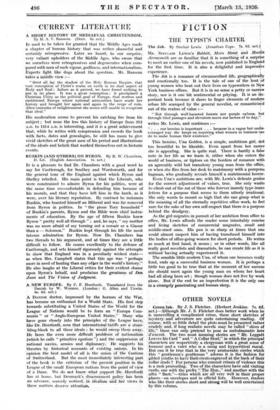RUSKIN (AND OTHERS) ON BYRON. By R. W. Chsmbers, D.
Lit. (English Association. is. net.) Ix is a pleasure to find Dr. Chambers with a good word to say for Castlereagh, for Southey and Wordsworth, and for the general tone of the England against which Byron and Shelley rebelled. His main point is that the Liberals, who were constrained to admire Byron for his politics, were at the same time uncomfortable in defending him because of his morals, and that they have left him in the lurch, as it were, over his literary reputation. By contrast he instances Ruskin; who boasted-himself an Illiberal and was far removed from Byron in politics. In " the pious Tory household " of Ruskin's parents, Byron and the Bible were chief instru- ments of education. By the age of fifteen Ruskin knew Byron " pretty well all through " ; and, he says, " my mother was no more afraid of my turning out a corsair or a Giaour than a — Solomon." Ruskin kept through his life the most intense admiration for Byron. Now Dr. Chambers has two threads to his argument, and at times they are a little difficult to follow. He comes excellently to the defence of Castlereagh, and sets himself rigorously against the attempts to show that England was in a peculiarly wicked state— as when Mrs. Campbell states that this age was " perhaps more in need of healing than any other in the world's history." He also laughs at the Liberal critics for their evident shame upon Byron's behalf, and proclaims the greatness of Don Juan and The Vision of Judgment.






























































 Previous page
Previous page